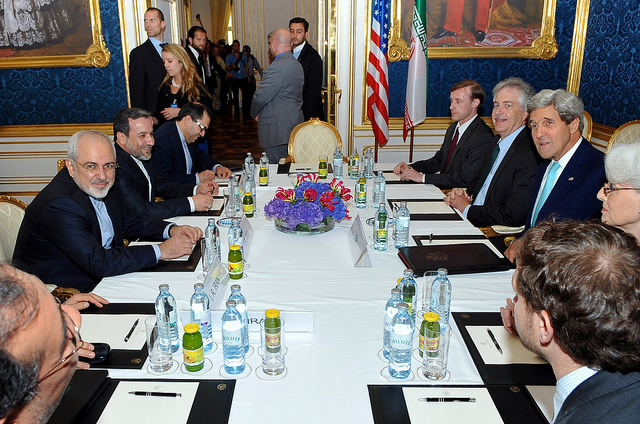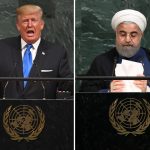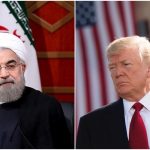by Shireen T. Hunter
Another round of negotiations between world powers and Iran on its nuclear program ended without any agreement in sight last week in New York. Many causes for the failure to reach an agreement have been cited, including: the number of centrifuges Iran should be allowed to keep; the still ambiguous status of the Arak heavy water reactor; the few remaining unanswered questions posed by the International Atomic Agency (IAEA) to Iran; and last but not least, the question of when and how much of the sanctions imposed on Iran will be lifted, whether they will be lifted at all, or, as put by US negotiator Wendy Sherman, they will simply be suspended.
All of these issues have certainly impeded a comprehensive agreement. However, they are not the ultimate causes of the failure of the negotiations thus far. Nor is Iran’s nuclear program per se the reason for the tensions in its relations with the West. In fact, the dispute between the West and Iran’s nuclear program is just a symptom of more fundamental disagreements between the two, or, to put it more correctly, between hardliners within Iran and the West.
The real causes of the failure of the negotiations between Iran and the P5+1 [US, UK, Russia, France, China, plus Germany] can be summarized as follows.
1. Divergent understanding of what non-proliferation is all about. An underlying problem between Iran and the P5+1 is that Iran sees the non-proliferation issue as a technical and legal question that can be resolved by working out the proper legal and technical solutions. Yet, both historically and today, as with any other arms limitation process, non-proliferation has never been primarily about technicalities. Rather it has always been about power and about securing and then locking in a balance of power that favors one side. In other words, a country or group of countries that have enjoyed military superiority have tried to freeze this balance and thus keep their advantage, whereas those in a less favorable position have opposed such measures until they could reach a more favorable balance of power before agreeing to any freeze.
In the case of Iran, the goal of the West and Iran’s Middle Eastern neighbors is to ensure that Iran would at no time have the capability to disrupt the regional balance of power. This is neither a new phenomenon nor is it solely nuclear-related. A sharp improvement in Iran’s conventional military power would also be viewed with alarm. Even when, under the Shah, Iran was a Western ally and while the Soviets were arming Saddam Hussein to the teeth, there were calls in the US by influential politicians to stop arms sales to Iran.
The nuclear issue is therefore just part of Iran’s containment, as are the sanctions. The dispute has allowed Western powers, as well as China and Russia, to impose sanctions on Iran to severely undermine its economy while sapping its people’s energies and creating social tensions with the aim of implosion and political change. China and Russia may not be interested in a political implosion in Iran, but they certainly prefer a moribund Iran, which they can flood with their goods and manipulate to their own ends.
2. Iran’s regional policies and its anti-imperialist rhetoric. The most important impediment to any agreement with Iran is its posture on the Arab-Israeli conflict, and especially its hostility towards Israel. Otherwise, why has there been no Western effort to rein in Pakistan’s nuclear weapons arsenal, which has been growing at a tremendous pace? If the risk of proliferation is a major concern, why has this concern not applied to Pakistan? This has largely been because Pakistan, despite its Islamic pretensions, does not interest itself in the Palestinian problem. In all other regions, Iran has pursued a pragmatic and even concessional policy towards its neighbors; but it has so far refused to openly and unequivocally change its posture on the Arab-Israeli conflict. It is hard to believe that any agreement can be reached with Iran before it is acceptable to Israel, and this is unlikely until some change has occurred in Iran’s approach. However, short of the dramatic act of recognizing Israel, today no softening of Iran’s tone will be sufficient for Israel or at least for its hawks. This is so because Iran has come to justify many of the strategies of Israel and other regional countries.
At the international level, Iran cannot hope to be treated as a full-fledged member of the community of states, while simultaneously calling for its fundamental disruption, even if Iran’s efforts have generally been limited to rhetoric. It is therefore difficult to see how there can be an understanding between Iran and the West until Iran stops its so-called anti-Imperialist crusade and pursues its efforts to reform a decidedly unjust international system through more accepted methods.
3. The Iranian threat as the excuse for many policies. The sad truth is that in the post-Soviet world, many countries have used the so-called Iranian threat to achieve a range of objectives. For regional countries, these objectives include justifying their value to the West and receiving financial and military support. Meanwhile, in Western countries, some entities use the Iranian threat to ask for more defense spending and to promote arms sales to regional countries. For all of these players, Iran’s return to the international community would leave them with an enemy vacuum. So they will do all they can to prevent this from happening.
4. The conflict with the West as an instrument of domestic politics in Iran. Meanwhile, in Iran too differences with the West, especially the US, have served to sustain a particular vision of what Iranian society and polity should be, and to serve the parochial interests of certain political groups and economic cliques, which benefit from the current conditions and enrich themselves while the country’s problems mount. Any reaching of a modus vivendi with the West would deprive them of their power and of their golden goose. Moreover, the cultural conservatives fear that Iran’s opening up to businesses, tourists and other exchanges would affect the country’s cultural dynamics and undermine their power base.
5. A more long-term Iranian question. Beneath all these issues lies a more fundamental cause of friction between Iran and the global powers, which is endemic to middle-sized powers, especially in geopolitically sensitive regions. Since the time of the Greeks and the Persians, the West has had an ambivalent view of Iran, both admiring and despising it. In more recent history, the West’s approach toward Iran was essentially developed by Britain and was based on the idea of keeping Iran “moribund”—alive enough to serve as a potential buffer but not strong enough to pose a challenge. The US has essentially pursued this British policy towards Iran.
This view of Iran today is reflected in Western demands that Tehran help defeat the radical group that calls itself the Islamic State (aka ISIS, ISIL or IS) while having no say in Iraq or Syria or Afghanistan—an unrealistic and unreasonable standard. The West and other big powers should decide what kind of Iran they could live with. Can they handle a progressive but strong and assertive Iran? Or is any kind of strong Iran unacceptable? If the latter is the case, then there is no chance that sanctions will be lifted. If the purpose were primarily to try moving Iran toward openness domestically and a more cooperative stance in the region, then pressures on it should have been eased long before now. It is sobering to reflect that the sanctioning of Iran gathered speed when reformist and pragmatic politicians were in power. While pressuring measures have likely helped push Iran to the bargaining table over its nuclear program, within Iran these pressures have so far only emboldened conservatives.
6. The Onus is on Iran. Every state is responsible for safeguarding its own interests and should not expect others to carry out its aims. Thus Iran’s leaders must now decide what they value most: the country and its people, some vague revolutionary objective, or, even less nobly, their own parochial interests. Life is not fair and international politics are particularly brutal, especially for the less powerful. Bemoaning this state of affairs and calling the system unjust will not get Iran anywhere. Its leaders have to grow wise and protect first and foremost their own country and people. Only then should they think about trying to reform the international system and liberate the oppressed!






So what is Iran supposed to do. Just give in to US/Israel demand? Is that what you are proposing? Iran should not get involved in ISIS affair. ISIS is an American and CIA/Mosad creation and they should deal with it. Iran should just do what it has been doing and continue its research and development in nuclear enrichment and technology. The West wants the Shah back but he is soooooo dead. Palestinians have only one friend left in the world and that is Iran. The hell with Israel and it puppet regime in USA.
All of this WMD nonsense has been a fabricated canard, and Gareth Porter’s exhaustive research for his book “Manufactured Crisis” has been proof positive of it.
Iran holds some important cards- namely the serious and practical desire by important elements of our business community to normalize relations and do business with Iran, as well a desire by Brzezinski and his followers to see Iran competing with Russia in the oil and gas market- for example as a way to revive the Nabucco pipeline project (with Iran as its major supplier) to make Nabucco profitable and Russia’s South Stream redundant. The problem with Netanyahu and AIPAC is that they are always shooting America in the foot if it means promoting Israel’s interest- in this case, keeping Iran out of the European energy market and as any competitive threat to Israel’s own energy ambitions and perceived economic opportunities. And the problem with Brzezinski is that he is still fighting a Soviet Union that no longer exists.
The other card is Iran’s chance now, regardless of the sanctions, to develop its energy infrastructure without the West, but instead with the support of Russia (and China), e.g. with agreements such as the one they’ve already signed for Russia to build a number of power plants in Iran, including two commercial use nuclear plants with state of the art Russian nuclear technology.
Our National Security Council and State Department would be even more shortsighted than usual, if they were to continue to bow to Israel’s demands to sabotage any deal that contemplates a nuclear program of any kind, or to a fear of losing AIPAC money and domestic political support for the November elections. If they really care about the nation’s long term interests, or have any pragmatic business sense, and have not forgotten everything about the art of diplomacy, they’ll cut a good deal- after all, it’s been staring them in the face, even before these negotiations began.
Frankly, it’s time we stopped making war and destroying more and more of the planet every time we didn’t get what we wanted or we thought our ambitions to be ‘king of the hill’ were threatened, and finally got down to the business of doing the type of business that benefitted all parties to the deal.
Professor Hunter has persistently counsels Iranian leadership to surrender its rights or whatever the US, indeed Israel, desires, neglecting the vast majority of Iranians support the position of the government on nuclear matter. Ms. Hunter’s prescriptions, similar to countless Think Tanks, will not cure the patients.
Importantly, American intelligence enterprise has repeatedly stated Iran does not have a nuclear weapon program and is not seeking nuclear arms. Yet, thanks to a certified liar, the bombastic Israeli Prime Minister, AIPAC, the enticed media, the lured Congress, and the tempted Senate nobody believes this! It would be wise for the US to remove all brutal sanctions against Iran soon if it does not intend to make the situation worse in Middle East. We badly needed Iran yesterday! If this sensible path is not followed, the US will remain in a state of war in Middle East and Africa, creating for us more foes, carnage and exhausting our resources much needed at home six years ago, and more vital for our peace and tranquility now and in the future.
The President must not neglect that the two last proxy wars for Israel created nearly 50 million new poor in our country adding to the prior 50 million in dire need. This is mind bugling. Thanks to Presidents after the late Mr. Johnson, we currently have 100 million poor and new poor in the US, aside from over two million people in confinements. Based on data in 2011, nearly 1.4 million people were part of gangs in the US, and more than 33,000 gangs were operating in our country! Interestingly, we are the richest nation in the world.
It’s amazing to me that the most significant obstacle to a nuclear deal is not mentioned here and that is Supreme Leader Khamenei’s mouth. Several public rants earlier this summer basically killed all hopes of getting a deal by July this year when he denounced the US yet again and reiterated Iran’s position that it would not give up its centrifuge refining capacity, nor its missile technology. And since the constitution grants Khamenei virtually absolute power over foreign affairs, especially international treaties and agreements, his mouth is the most powerful voice at the bargaining table and his wishes are the elephant in the room that Iran’s supporters wish would simply go away. While Rouhani and Zarif do linguistic somersaults between moderating and supporting Khamenei’s hard lines, it has left the West and the P5+1 group with little choice other than to shrug and put off future talks. Iran has no one to blame for the current impasse than itself and until it can divorce itself from its divisive and explosive talks and policies, the West will rightly hold off on any deal.
There can not be a deal with Iran and the West. West is not dealing in good faith. It was visible in the previous round of “negotiations” when US came with an absurd idea of inclusion of Iranian missile program into the equation of the negotiations. It is also visible in refusal of the West to even see nuclear arsenal of Israel, which they actually helped to build as lately was revealed. Bad faith of the West (Anglo-Saxon coalition with their Frankish brethren in France) in negotiations is very visible in total support of Zionists lunatics. Trying to heal their guilt from their own mistreatment of Jews in quite recent history they are dancing to Zionists music with no feeling of shame. It would be more appropriate if this music in negotiations would be played by Zionists themselves (not their puppets in the West) for the whole world to hear. We have been on the diet of unrelenting threats of “Iranian nuclear attack next week” from Tel Aviv for last 25 years (at least) and everybody with little healthy brain cells should remember it. We have meanwhile seen more aggressions on their neighbors from Zionists then from Iranians in last 300 years (and maybe even more).
It is all about power, stupid – that is the thing. And that is also why Iranians can not budge.